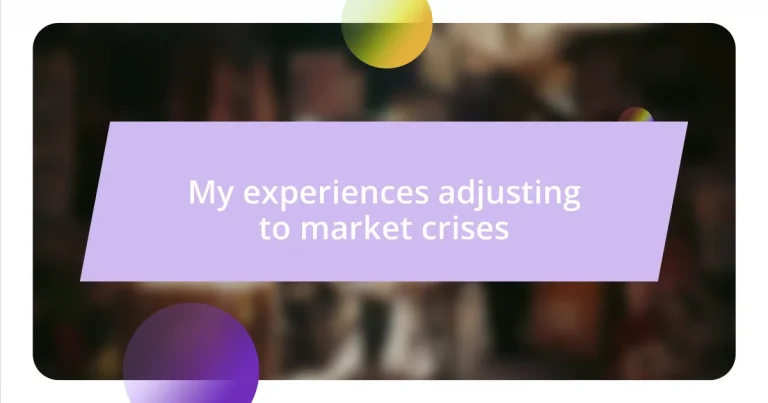Key takeaways:
- Understanding market crises requires recognizing personal emotional triggers and developing coping strategies to manage reactions during downturns.
- Building a proactive mindset and implementing strategic financial measures, such as diversification and budgeting, empowers individuals to navigate uncertainty effectively.
- Learning from past experiences and planning for future uncertainties through scenario analysis and technology aids in enhancing adaptability and resilience in investment strategies.
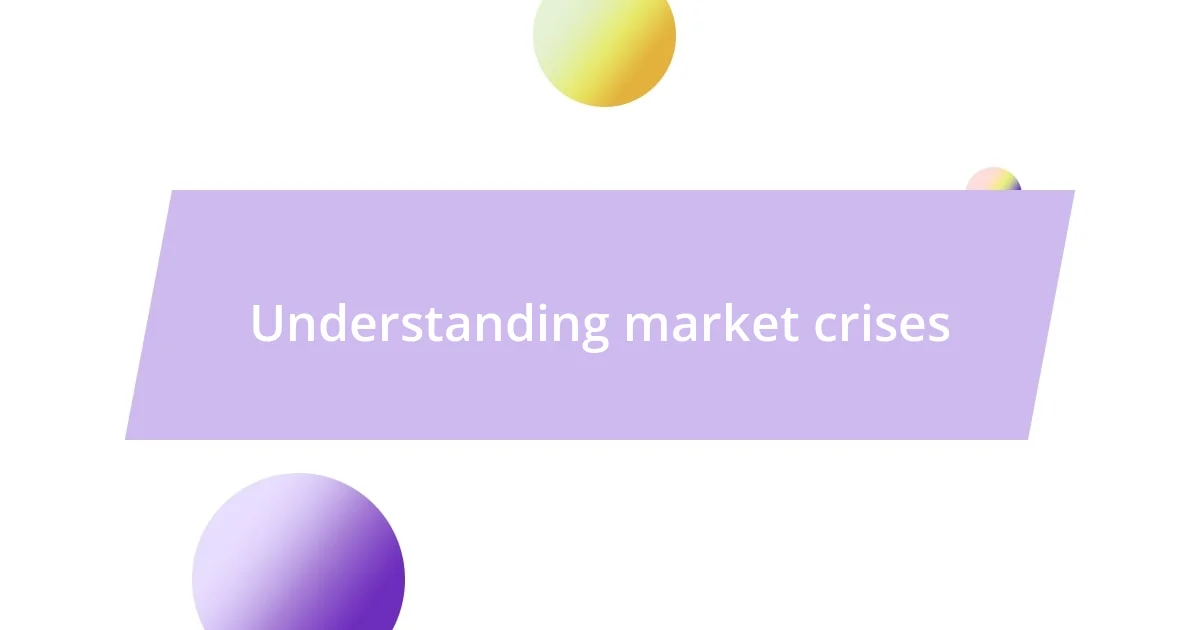
Understanding market crises
Market crises can be overwhelming, often arising from unforeseen factors like economic downturns or global events that shake investor confidence. I vividly remember experiencing the shock of the 2008 financial crisis; it was as if the floor had dropped out from under me as I watched stock prices plummet. I couldn’t help but wonder, how did we let it get this far?
As I navigated the swirling uncertainty, I realized that understanding the root causes of these crises is essential for anyone looking to make sense of the chaos. For me, it was a steep learning curve—I began to see how interconnected markets are, and how a crisis in one country could ripple across the globe. Does the complexity of it all make you uneasy too?
In my journey, I learned that these crises often serve as a stark reminder of the fragility of our economic systems. It’s during these moments of turbulence that I found a deeper appreciation for risk management. I’ve come to believe that a proactive approach, fueled by knowledge and awareness, can help us weather the storm—what about you? How do you prepare for the unexpected?
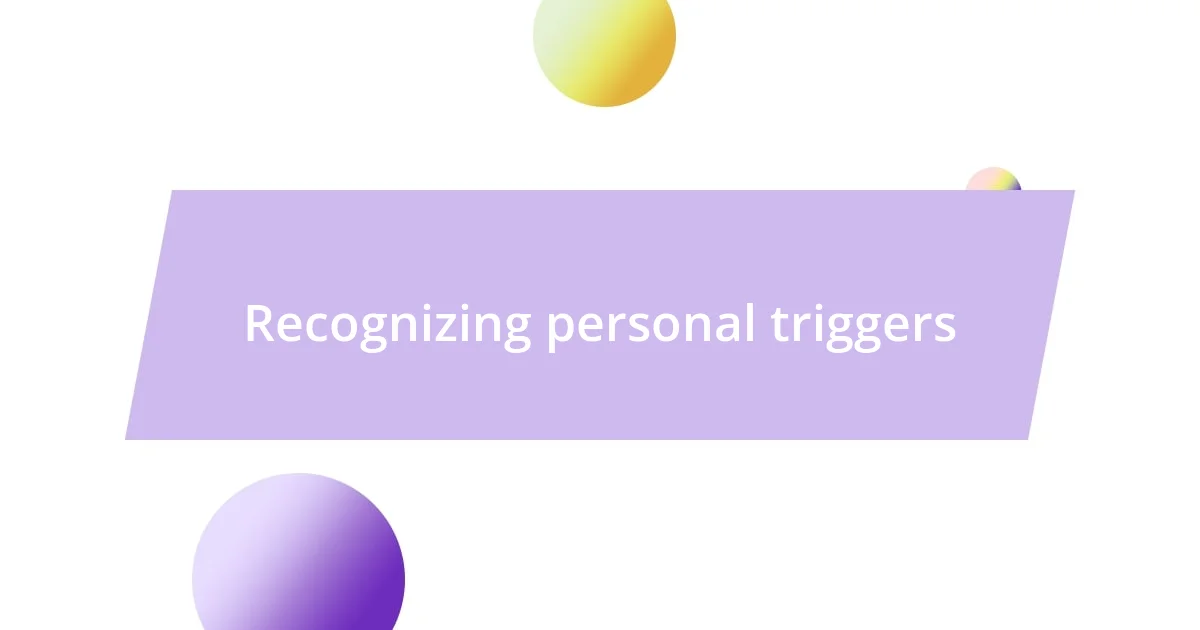
Recognizing personal triggers
Recognizing personal triggers is an essential part of adapting to market crises. I’ve found that stress often manifests in specific ways for me, like an overwhelming urge to check my investments constantly or feeling anxious when reading financial news. By identifying these triggers, I can create strategies to manage my reactions and make more informed decisions.
One thing that surprised me during a downturn was how my emotions tied directly to market fluctuations. After the panic of the early pandemic, I realized that my reaction to falling stocks wasn’t just financial but deeply personal. It felt like a rollercoaster—my heart raced with each dip—and understanding that helped me find healthier outlets, like talking to friends or seeking professional advice.
Through trial and error, I discovered that my personal triggers aren’t just tied to market performance; they can also be influenced by external factors, like negative news cycles or personal health issues. Monitoring these triggers, I began journaling my feelings and analyzing how they impacted my behavior during crises. This reflection offered me valuable insights, helping me regain a sense of control when the market seemed chaotic.
| Trigger | Personal Reaction |
|---|---|
| Market Downturn | Increased anxiety and checking investments |
| Bad News Reports | Heightened emotional response and negativity |
| Peer Discussions | Test anxiety; fear of missing out |
| Health Concerns | Impulse selling; panic reactions |
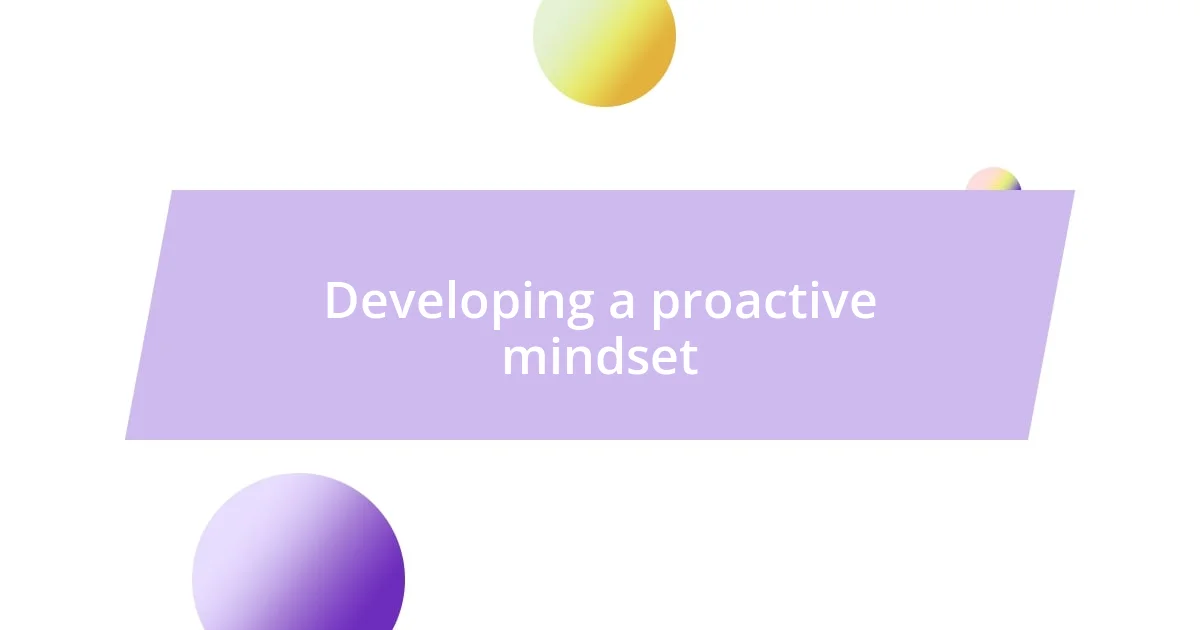
Developing a proactive mindset
Developing a proactive mindset has been a game-changer for me during market crises. I remember one particularly tough day during a downturn when I felt paralyzed by fear. Instead of letting panic dictate my actions, I chose to focus on what I could control. I started crafting a detailed plan, outlining steps to mitigate risks while actively educating myself about the market landscape. This shift transformed my stress into empowerment—I was no longer a passive observer; I was an engaged participant.
To cultivate a proactive mindset, I’ve found the following strategies incredibly useful:
- Stay informed: Regularly read financial news and market analysis to identify potential risks.
- Set clear goals: Establish both short- and long-term financial objectives to maintain focus.
- Build a safety net: Have an emergency fund in place for unforeseen circumstances.
- Engage with peers: Discuss strategies and share insights with trusted friends or financial advisors.
- Practice emotional regulation: Develop techniques like deep breathing or meditation to maintain composure.
- Reflect on past experiences: Think about what worked or didn’t in previous crises to inform future decisions.
By actively embracing these strategies, I’ve discovered that a proactive approach doesn’t just buffer against uncertainty; it fosters resilience and adaptability. It’s empowering to know that while I can’t control the markets, I am in charge of how I respond to them. Have you found ways to take charge in the face of chaos?
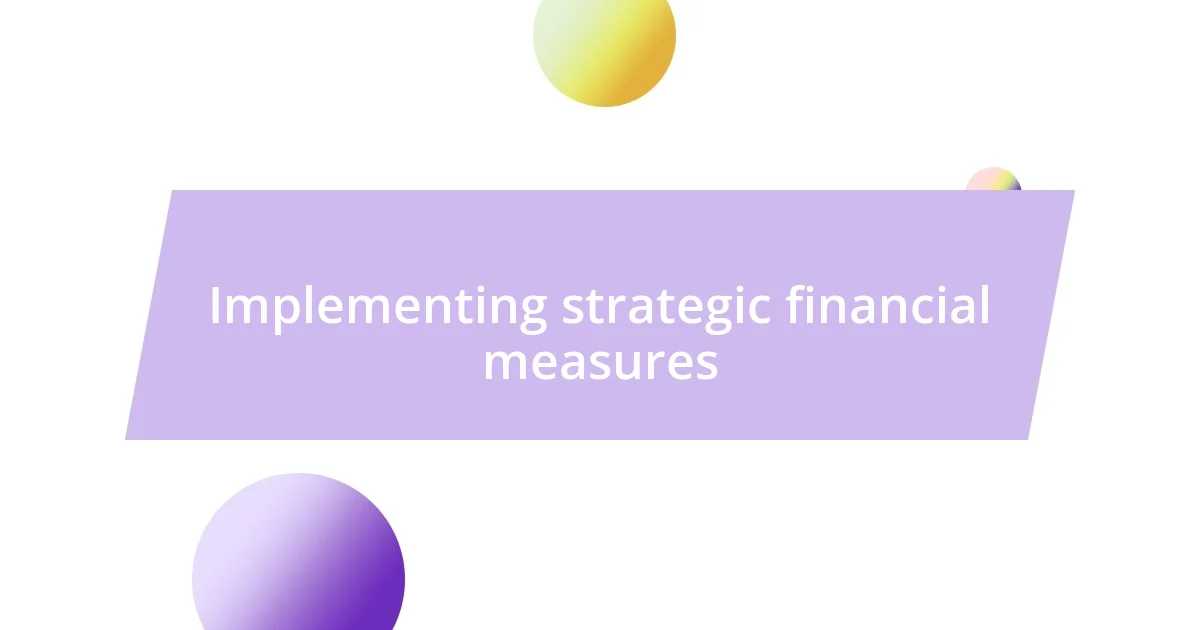
Implementing strategic financial measures
Implementing strategic financial measures has been pivotal during market crises for me. I recall a particular moment when I realized my investment strategy needed refinement. I decided to develop a diversified portfolio, spreading my assets across different sectors. The moment I did this, it felt like a weight lifted off my shoulders; I wasn’t just riding the market waves—I was actively managing risk.
Budgeting became another cornerstone in my financial strategy. I meticulously tracked my expenses and made adjustments to ensure I wasn’t living beyond my means. This wasn’t just about keeping more money in the bank; it was about peace of mind. I remember feeling a surge of responsibility when I created a detailed budget plan. Knowing that I had a financial buffer allowed me to weather downturns with more confidence.
I also found that having a clear, actionable financial roadmap gave me direction when uncertainty loomed. One year, when the market dipped significantly, I revisited my plan and identified areas to innovate. This involved reallocating resources to sectors that showed resilience. I couldn’t help but experience a sense of calm amidst the chaos. Why? Because I had a strategy. I learned that adaptability and foresight are my greatest allies in turbulent times. How have you adjusted your financial measures in response to market shifts?
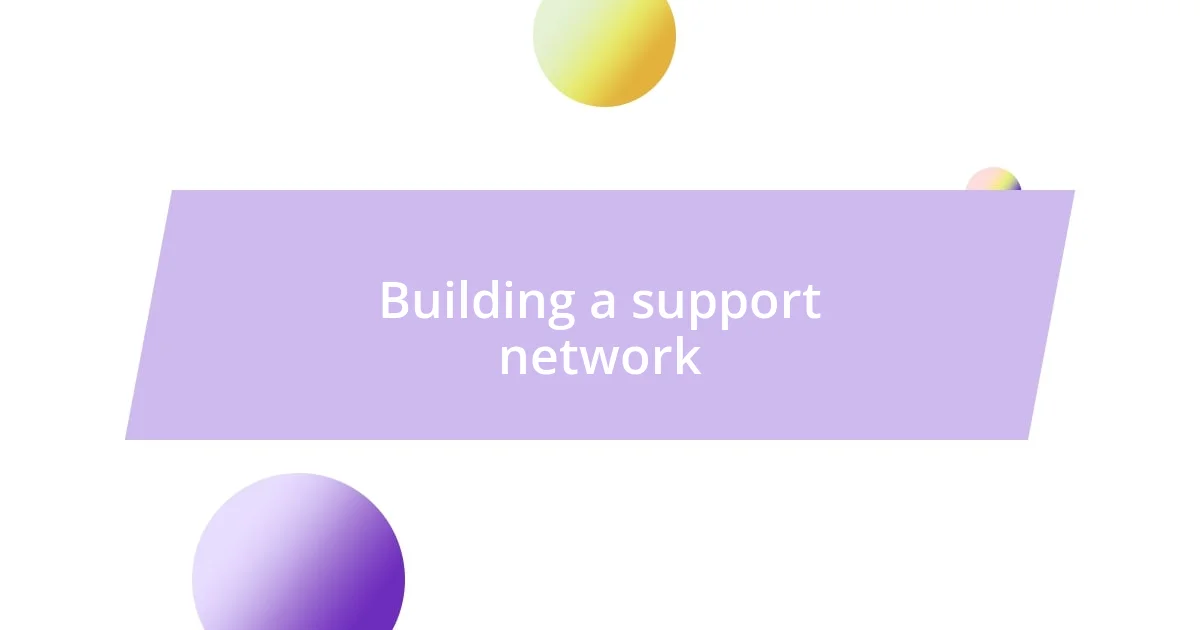
Building a support network
Building a support network has been invaluable in navigating market crises. I learned this firsthand during a particularly volatile period when I felt isolated and overwhelmed. One afternoon, I reached out to a close friend who had experience in finance. Just talking through my concerns helped dispel some of the anxiety, and his insights offered new perspectives that eased my fears. Have you ever had a conversation that changed how you viewed a challenging situation?
Connecting with others who have walked a similar path has also enriched my understanding of market dynamics. I remember joining a local investment group, where members shared both successes and failures. This camaraderie not only provided practical advice but also a sense of belonging—a reassuring reminder that we’re all in this together. The bonds that formed in those meetings created a safety net of shared experiences and support that bolstered my confidence.
Being part of a support network can be a game-changer during uncertain times. The wisdom from mentors and peers has guided my decisions and helped me stay grounded. Whether it’s a casual coffee chat or a structured investment workshop, the insights I’ve gained from these interactions have been eye-opening. Have you thought about who you can lean on for support or share ideas with? Building these relationships can be just as crucial as any financial strategy.
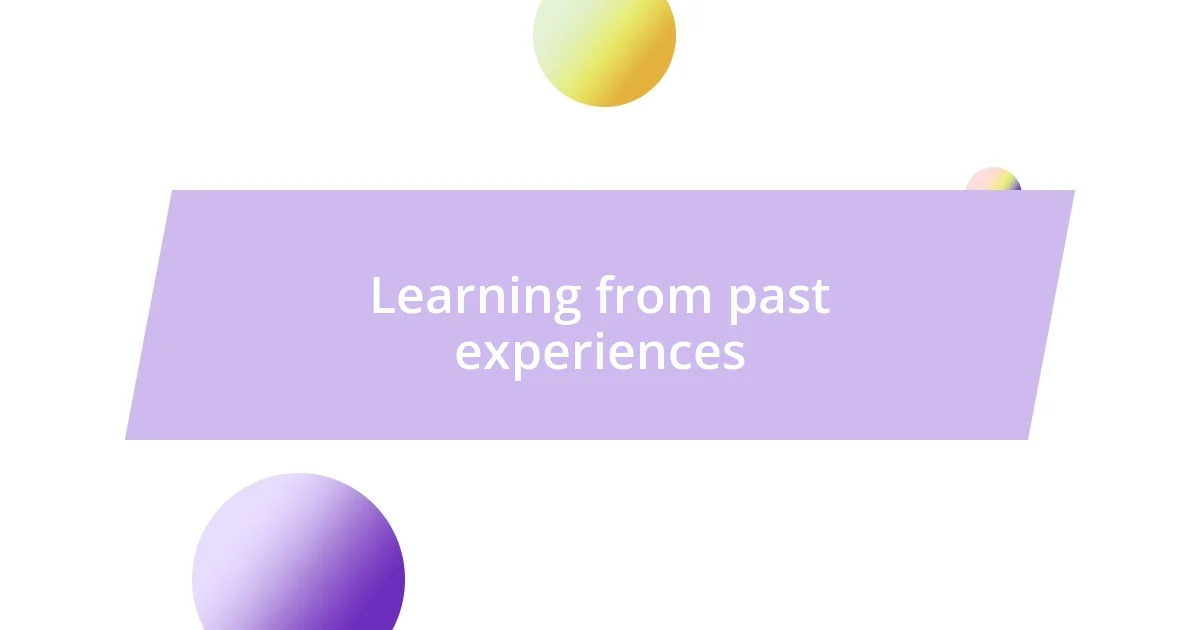
Learning from past experiences
Reflecting on my past experiences during market crises, I’ve realized that each setback comes with valuable lessons. For instance, during the 2008 financial meltdown, I was caught off guard. It was only after I combed through my portfolio and identified the red flags that I understood how much I had depended on assumptions rather than solid data. This experience taught me to never overlook due diligence again. How often do we jump into investments without fully assessing the risk?
Over time, I’ve embraced a practice of journaling my trading and investment decisions. It’s fascinating to look back at my thought processes during different market conditions. I remember one entry where I described my hesitation to sell during a downturn, which later turned into a regret as I watched my losses mount. Recognizing this emotional response has helped me develop a more disciplined approach. Have you ever thought about how documenting your experiences could change your perspective?
Ultimately, the most significant lesson I’ve learned is to view every market dip as an opportunity for growth. Each crisis has revealed my strengths and weaknesses, prompting me to adapt and evolve. For example, after a particularly challenging year, I took a course in risk management, which has profoundly impacted my investment strategy. It’s curious how discomfort can lead us toward better preparedness and resilience. What are you doing today to learn from your past experiences for a more secure tomorrow?
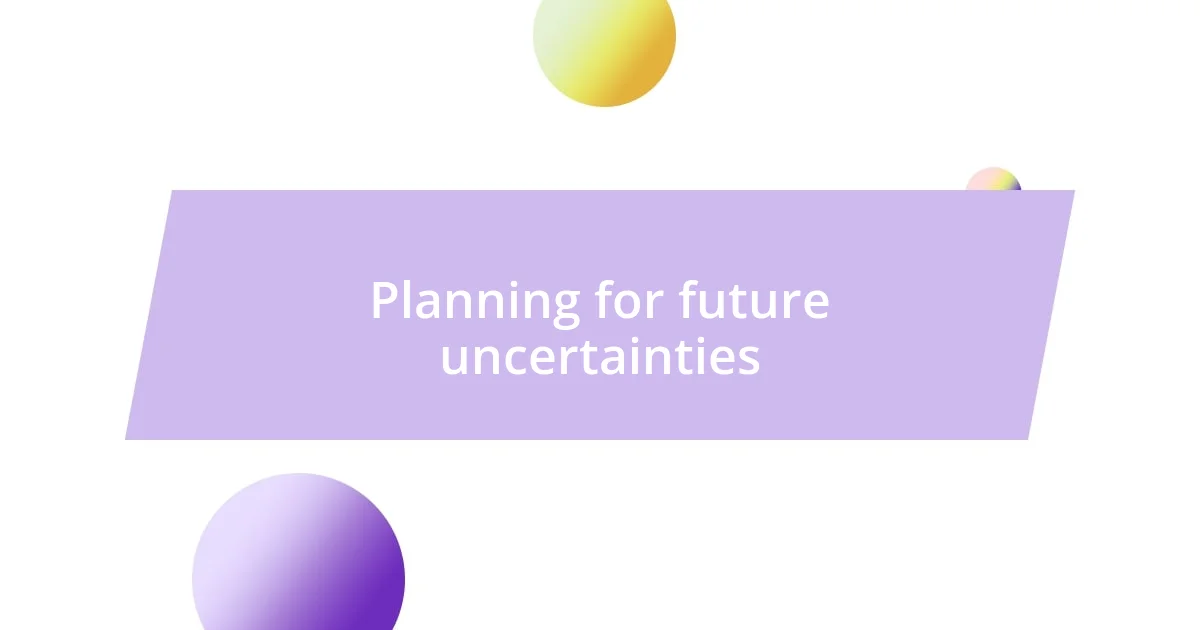
Planning for future uncertainties
Planning for future uncertainties requires a proactive approach that I’ve had to master over time. I vividly remember a moment during a market crash when I realized my portfolio wasn’t diversified enough. My panic set in quick as I watched my investments plummet. This experience taught me the importance of having a well-rounded strategy that involves not just stocks, but also bonds, real estate, and alternative investments. How diverse is your portfolio?
One of the most effective strategies I’ve adopted is scenario planning. I vividly recall sitting with my financial advisor as we mapped out various potential market conditions, from mild downturns to full-blown crises. This exercise not only alleviated some of my anxiety but also armed me with a sense of preparedness. I felt a surge of confidence knowing I wasn’t merely reacting to market shifts, but rather anticipating them. Have you ever taken the time to envision different scenarios that could impact your investments?
Moreover, leveraging technology has been a game-changer for my planning process. I invested in financial software that allows me to model different outcomes based on market conditions. This innovation has transformed what used to be a daunting task into a manageable one. I recall one day when I simulated a downturn and was amazed at how certain adjustments could mitigate my losses. The insights gained from this exercise solidified my belief that understanding potential future scenarios is essential. How do you utilize technology to help you in your financial planning?












